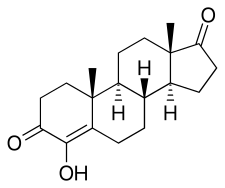 | |
| Clinical data | |
|---|---|
| Trade names | Lentaron, others |
| Other names | 4-Hydroxyandrost-4-ene-3,17-dione |
| AHFS/Drugs.com | International Drug Names |
| Routes of administration | Intramuscular injection |
| Drug class | Aromatase inhibitor; Antiestrogen |
| ATC code | |
| Identifiers | |
| |
| CAS Number | |
| PubChem CID | |
| ChemSpider | |
| UNII | |
| KEGG | |
| ChEBI | |
| ChEMBL | |
| CompTox Dashboard (EPA) | |
| ECHA InfoCard | 100.153.838 |
| Chemical and physical data | |
| Formula | C19H26O3 |
| Molar mass | 302.414 g·mol−1 |
| 3D model (JSmol) | |
| |
| |
| | |
Formestane, formerly sold under the brand name Lentaron among others, is a steroidal, selective aromatase inhibitor which is used in the treatment of estrogen receptor-positive breast cancer in postmenopausal women.[1] The drug is not active orally, and was available only as an intramuscular depot injection. Formestane was not approved by the United States FDA and the injectable form that was used in Europe in the past has been withdrawn from the market.[2] Formestane is an analogue of androstenedione.
Formestane is often used to suppress the production of estrogens from anabolic steroids or prohormones. It also acts as a prohormone to 4-hydroxytestosterone, an active steroid which displays weak androgenic activity in addition to acting as a weak aromatase inhibitor.
| Generation | Medication | Dosage | % inhibitiona | Classb | IC50c |
|---|---|---|---|---|---|
| First | Testolactone | 250 mg 4x/day p.o. | ? | Type I | ? |
| 100 mg 3x/week i.m. | ? | ||||
| Rogletimide | 200 mg 2x/day p.o. 400 mg 2x/day p.o. 800 mg 2x/day p.o. | 50.6% 63.5% 73.8% | Type II | ? | |
| Aminoglutethimide | 250 mg mg 4x/day p.o. | 90.6% | Type II | 4,500 nM | |
| Second | Formestane | 125 mg 1x/day p.o. 125 mg 2x/day p.o. 250 mg 1x/day p.o. | 72.3% 70.0% 57.3% | Type I | 30 nM |
| 250 mg 1x/2 weeks i.m. 500 mg 1x/2 weeks i.m. 500 mg 1x/1 week i.m. | 84.8% 91.9% 92.5% | ||||
| Fadrozole | 1 mg 1x/day p.o. 2 mg 2x/day p.o. | 82.4% 92.6% | Type II | ? | |
| Third | Exemestane | 25 mg 1x/day p.o. | 97.9% | Type I | 15 nM |
| Anastrozole | 1 mg 1x/day p.o. 10 mg 1x/day p.o. | 96.7–97.3% 98.1% | Type II | 10 nM | |
| Letrozole | 0.5 mg 1x/day p.o. 2.5 mg 1x/day p.o. | 98.4% 98.9%–>99.1% | Type II | 2.5 nM | |
| Footnotes: a = In postmenopausal women. b = Type I: Steroidal, irreversible (substrate-binding site). Type II: Nonsteroidal, reversible (binding to and interference with the cytochrome P450 heme moiety). c = In breast cancer homogenates. Sources: See template. | |||||
References
- ↑ Pérez Carrión R, Alberola Candel V, Calabresi F, et al. (1994). "Comparison of the selective aromatase inhibitor formestane with tamoxifen as first-line hormonal therapy in postmenopausal women with advanced breast cancer". Ann. Oncol. 5 (Suppl 7): S19–24. PMID 7873457.
- ↑ "Formestane".